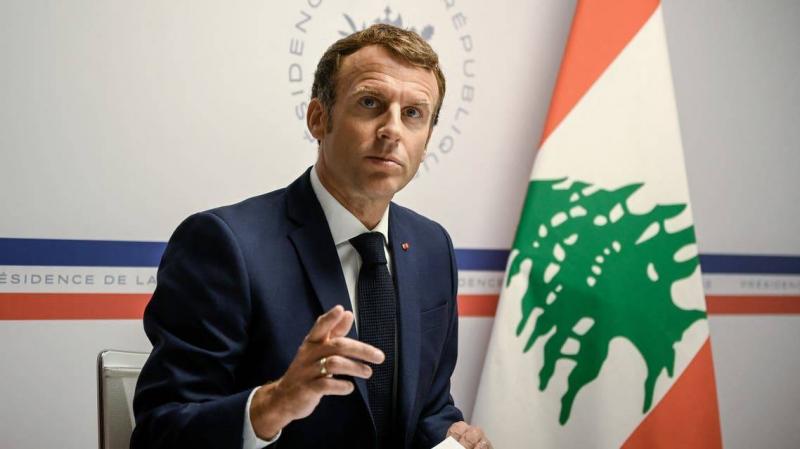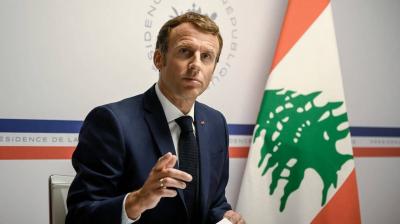The international donor conference for Lebanon commenced today, Tuesday, via video link at the invitation of France and under the auspices of the United Nations. This is the third such conference since the explosion, aimed at raising $350 million. French President Emmanuel Macron, in his opening speech, stated, "We will provide assistance in euros to Lebanon to support families, students, and the education sector. France will send an additional shipment of medicines to Lebanon tomorrow," adding that "France will contribute to the reconstruction of the Port of Beirut." France will also send 500,000 doses of COVID-19 vaccines to Lebanon. Macron praised "the essential role of the Lebanese army in supporting stability" and noted that the assistance provided by the World Bank to Lebanon "will be disbursed transparently."
He considered that "the crisis in Lebanon is the result of a collective failure... the entire Lebanese political class is responsible for the crisis... the Lebanese political class is entirely to blame for the tragic situation." He continued, "No commitments have been fulfilled, and Lebanon deserves more than that," adding, "A government must be formed, compromises must be found, and a roadmap must be implemented." He emphasized that "today's conference is humanitarian and there will be no blank checks," adding, "We have taken strict measures against corrupt Lebanese politicians." Macron reminded that "the Lebanese people are waiting for results from the port investigation" and that France "is ready for technical cooperation." Regarding the upcoming parliamentary elections, he stated, "Everyone must take responsibility to ensure elections in the spring." He reassured the Lebanese people that "France and the international community are by your side," promising "new commitments for direct support to the Lebanese people" amounting to €100 million. He concluded, "The crisis in Lebanon is not the result of fate but of a dysfunctional political system."
For his part, Lebanese President Michel Aoun stated, "Our country is mired in political crises, and details have hindered the formation of a government," wishing for "the formation of a government capable of implementing necessary reforms and holding elections." He added, "The amount we will receive from the international fund must be spent in a way that prevents collapse," further stating, "We insist on the auditing process of the Central Bank's accounts." Aoun expressed gratitude to all countries and institutions for the aid sent over the past year, saying, "Lebanon depends on you; do not let it down." He also mentioned that "the full operational resumption of the Port of Beirut is an urgent necessity, and Lebanon welcomes any international efforts in this regard."
French President Emmanuel Macron is seeking to collect over $350 million in aid for Lebanon during the donor conference, which also aims to send another warning to the feuding Lebanese political elite. A year after the explosion that shook the capital's port and plunged Lebanon into an economic crisis, politicians have yet to form a government capable of rebuilding the country despite French and international pressures. A Macron advisor told reporters, "As the situation continues to deteriorate, the need for a government has become more urgent."
International efforts to pull Lebanon out of the crisis have been led by France. Macron has visited Beirut twice since the port explosion, increasing emergency aid and imposing travel bans on some senior Lebanese officials as part of his effort to secure a package of reforms. He also persuaded the European Union to approve a sanctions framework ready for use. However, his initiatives, including securing pledges from Lebanese politicians to agree on a non-sectarian expert government, have so far failed.
The conference last year following the explosion raised approximately $280 million, and emergency aid was withheld from what Macron described at the time as "corrupt hands" of politicians and was delivered through NGOs and relief groups. Macron's office indicated that the new humanitarian aid would be unconditional, but around $11 billion of long-term funding raised in 2018 remains withheld and is conditioned upon a series of reforms that the political authorities must implement.
On August 4, 2020, a fire broke out at the Port of Beirut, followed minutes later by a massive explosion at six o'clock (15:00 GMT), whose echoes reached the island of Cyprus, causing colossal damage to the port and surrounding neighborhoods, affecting most of the city and its suburbs. Authorities attributed it to 2,750 tons of ammonium nitrate that had been stored since 2014 in warehouse number 12 at the port. The explosion killed at least 214 people, including port employees and firefighters attempting to extinguish the fire, as well as individuals in their homes due to falling glass and others in their cars or in streets, cafes, and shops. Many families buried only the remains of their loved ones.
In a country that has experienced assassinations and explosions over the past twenty years, seldom fully investigated, with no accountability for their perpetrators, the Lebanese are still waiting for answers to determine responsibility for one of the largest non-nuclear explosions in the world.
The disaster of the explosion, compounded by the outbreak of the coronavirus beforehand, deepened the economic collapse that Lebanon has been experiencing since the summer of 2019, classified by the World Bank among the worst globally since the mid-19th century. More than half of Lebanese are now below the poverty line, and the Lebanese pound has lost over 90% of its value against the dollar, while prices of essential goods have risen by over 700% within two years. Since the port explosion, the international community has been providing direct humanitarian aid to the Lebanese without going through state institutions accused of corruption and waste.




